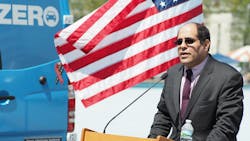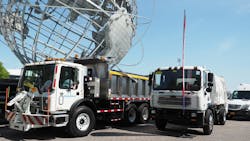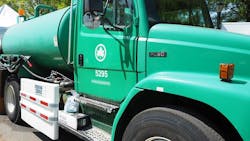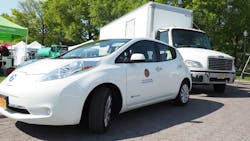Having just launched big initiatives to expand its use of alternative fuels, New York City's municipal fleet has another directive in mind as well: drivers will be prohibited from even hands-free cell phone use in trucks and other vehicles.
NYC Mayor Bill de Blasio and Dept. of Citywide Administrative Services (DCAS) Commissioner Lisette Camilo made the announcement yesterday, and DCAS Deputy Commissioner and Chief Fleet Officer Keith Kerman discussed the move at the 28th annual NYC Fleet Show held in Flushing Meadows Corona Park.
"The 80,000 New York City fleet operators who drive our 29,000 vehicles will no longer be allowed to use hands-free phones while driving," Kerman said. DCAS was asked to consider "all we could do" to improve safety, he contended, and examining cell phone use, surmised "there's absolutely no difference in the dangerous distraction in conducting a phone conversation — whether you're holding it [the phone handset] or you have a hands-free — when you're trying to drive."
DCAS will make the no-phones policy part of driver training going forward, according to Kerman. "If you see a city operator driving and using a hand-held phone, texting or having a conversation on a Bluetooth [headset], let us know about it; call 311," he told listeners.
Meanwhile, Kerman had a question for truck manufacturers: Why do you have safety features in place on your products for some countries and remove them for the U.S. market?
The case in point was side guards for trucks, which essentially are bumpers or barriers on the sides of trucks that help prevent struck pedestrians or bicyclists from getting dragged under the rear wheels. Kerman noted that such side guards have been the norm or required in Europe for decades. After determining their effectiveness, Mayor de Blasio signed legislation last summer requiring side guards on all the city's large trucks and private waste hauler trucks by 2024.
"All of them will be retrofitting and installing truck side guards," Kerman said. "We know based on the statistics that they will prevent about 10% of fatalities in accidents with pedestrians and bicyclists." He pointed out that NYC currently has "the largest rollout in the country" of some 375 truck side guard installations, but doesn't necessarily want the distinction.
"There should be millions of these and we should just be playing our small role," he argued.
Green fleet initiatives
On the sustainable fuels front, New York announced in December its NYC Clean Fleet initiative, which among other things puts the city on a trajectory to have the largest electric vehicle fleet in the country besides the federal government's within a decade.
"I'm happy to tell you the first orders of 225 electric vehicles have been placed and we're on pace," said Kerman. Some new NYC fleet electric vehicles including Nissan LEAF cars were on display at the show.
DCAS is also targeting a 50% total emissions reduction across the municipal fleet over the same time frame. The city has one of the most diverse portfolios of alternative fuels you'll find in fleets, with everything from electric to natural gas, hybrid power, biodiesel and solar energy powering vehicles of various kinds.
"The only way we'll meet that 50% goal is to change, almost completely, how we fuel, and get off fossil fuels for trucking," Kerman contended. "And we have every intention of doing that."
The city put out a request for information in December concerning alternative fuels, and Kerman praised the industry's "extraordinary engagement" in delivering more than 100 formal proposals. "We intend to respond to every single vendor that reached out to us," he said.
"The mayor has put the city's money where our ambitions are," Kerman quipped. "We have $4 billion we're going to spend on fleet and fuel over the next 10 years, and we want to direct as much of it as possible to the alternative fuel industry."
About the Author
Aaron Marsh
Aaron Marsh is a former senior editor of FleetOwner, who wrote for the publication from 2015 to 2019.



